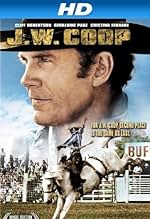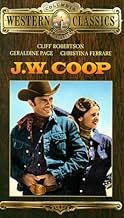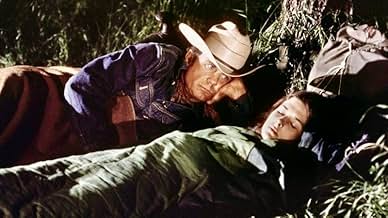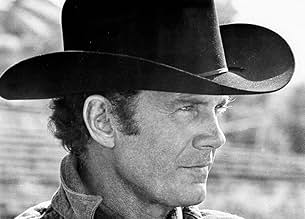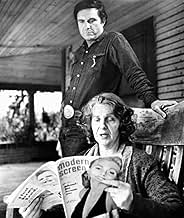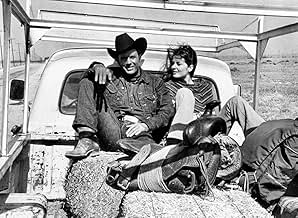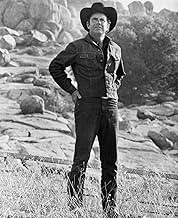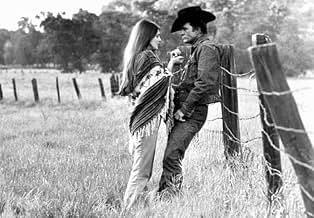After losing 9 years 9 months and thirteen days to prison, cowboy J. W. Coop is released to return to life as a professional rodeo cowboy in the 60's. Determined to make up for the lost 'pri... Read allAfter losing 9 years 9 months and thirteen days to prison, cowboy J. W. Coop is released to return to life as a professional rodeo cowboy in the 60's. Determined to make up for the lost 'prime' years of his career, he doggedly goes forward, and learns that not only has the busine... Read allAfter losing 9 years 9 months and thirteen days to prison, cowboy J. W. Coop is released to return to life as a professional rodeo cowboy in the 60's. Determined to make up for the lost 'prime' years of his career, he doggedly goes forward, and learns that not only has the business of rodeo changed during his incarceration but society as a whole has made dramatic chan... Read all
- Director
- Writers
- Stars
- Big Marge
- (as Marjorie Durant Dye)
- Bonnie May
- (as Mary Robin Redd)
- Director
- Writers
- All cast & crew
- Production, box office & more at IMDbPro
Featured reviews
Some would disagree with the ending, but I can see it no other way. If you want to see a movie about a man going after life this is one film sure to satisfy. I give JW COOP a three star [out of four] and it stands as one of my favorites.
Anyway, the titular figure is an enthusiast of the sport who wants to pick up where he left off following a 10-year stint in jail for fraud; after a pathetic reunion with his senile mother (a cameo, despite her second billing, by a disheveled Geraldine Page), he sets off to seek a prominent spot in the National Finals. This entails a series of contests across the country – he starts off by hitching rides to each destination, then borrows a van (through a friend) from a military base but, after scoring a number of successes and winning a pile of money, he can afford to fly the rest of the way.
Robertson meets spirited young hippie Cristina Ferrare; following the initial distrust (being a middle-aged uneducated cowboy himself, they have virtually nothing in common), he comes to appreciate her devoted presence by his side – however, when he finally proposes marriage, she quits him. Coop’s biggest rival is a brash stud half his age whose wealth is able to keep him well ahead of the game (getting to the various rodeo venues by way of a private plane). Still, our hero perseveres – but his dream seems to come to an end when he breaks a leg; undaunted, he decides to mount a particularly wild bull…but his triumph this time around is short-lived and he’s gored by the testy animal!
Robertson elicits fine performances all around and shows great feeling for small-town America – as well as passion for his central theme (which isn’t so much about achieving one’s goals no matter what, as how this often rings hollow when all one has to show for it is loneliness). A nice folksy score supplies the perfect accompaniment to the film’s attractive photography – offsetting the generally downbeat tone and the occasional instance of self-conscious direction (such as the use of abrupt zooms or Coop’s slow-motion last ride). Equally agreeable are its sparse moments of humor – namely the cowboy’s ironic home address, 1313 Luck Road, requested by an apologetic cop when he’s forced to give him a ticket (Coop’s driving his late father’s ‘smoking’ broken-down car) and the incident in the diner’s lavatory where rednecks attack the hero’s black pal but, even outnumbered, they beat up their assailants and, when the cops arrive, Robertson justifies the mess by claiming the locals had been making “weird advances”!
A labor love for Cliff Robertson, JW COOP is an indie-like movie developed in the 1970's studio system, where titles like POSEIDON ADVENTURE and TOWERING INFERNO were the only things that made sense at the time.
As a result, studio-type compromises are evident throughout--Christina Ferrare is atrocious as the hippie-chick who interjects JW's dust covered mind-set to the present. I'm certain the original script-by Gary Cartwright and the ingenious Bud Shrake was likely funnier and edgier.
What's left is still engaging, and the rest of the supporting cast is solid, the story interesting--spiced with wonderful little vignettes throughout. I highly recommend.
Did you know
- TriviaDuring the National Finals Rodeo sequence when the rodeo announcer is talking, the man with a cowboy hat and blue sport coat on and a blue scarf tie is Clem McSpadden. He was a nephew of Will Rogers and was a longtime Oklahoma State Senator. He was from Claremore, as was Will Rogers. He was also a famed rodeo announcer professionally.
- GoofsWhen JW is sitting on a bull, he is introduced to "Hot Pistol" whomever, and Larry Mahan; he asks for tips on riding the bull, and is told something about "marking him out"; there is no mark out rule in bull riding.
- ConnectionsReferenced in 'Obsession' Revisited (2001)
- How long is J W Coop?Powered by Alexa
Details
- Release date
- Country of origin
- Language
- Also known as
- J.W. Coop
- Filming locations
- McAlester, Oklahoma, USA(uncredited McAlester, Oklahoma)
- Production companies
- See more company credits at IMDbPro
Contribute to this page


